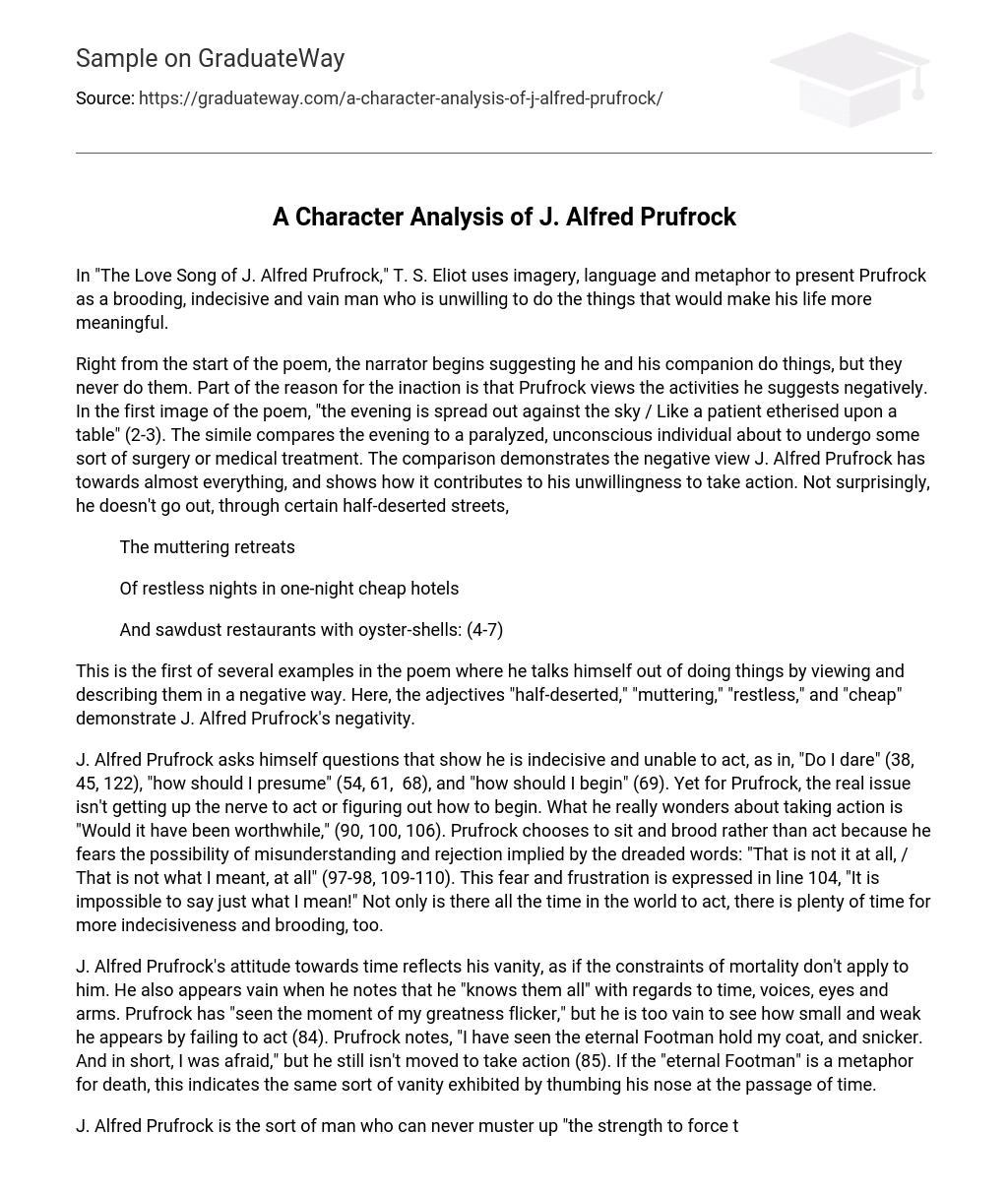In “The Love Song of J. Alfred Prufrock,” T. S. Eliot uses imagery, language and metaphor to present Prufrock as a brooding, indecisive and vain man who is unwilling to do the things that would make his life more meaningful.
Right from the start of the poem, the narrator begins suggesting he and his companion do things, but they never do them. Part of the reason for the inaction is that Prufrock views the activities he suggests negatively. In the first image of the poem, “the evening is spread out against the sky / Like a patient etherised upon a table” (2-3). The simile compares the evening to a paralyzed, unconscious individual about to undergo some sort of surgery or medical treatment. The comparison demonstrates the negative view J. Alfred Prufrock has towards almost everything, and shows how it contributes to his unwillingness to take action. Not surprisingly, he doesn’t go out, through certain half-deserted streets,
The muttering retreats
Of restless nights in one-night cheap hotels
And sawdust restaurants with oyster-shells: (4-7)
This is the first of several examples in the poem where he talks himself out of doing things by viewing and describing them in a negative way. Here, the adjectives “half-deserted,” “muttering,” “restless,” and “cheap” demonstrate J. Alfred Prufrock’s negativity.
J. Alfred Prufrock asks himself questions that show he is indecisive and unable to act, as in, “Do I dare” (38, 45, 122), “how should I presume” (54, 61, 68), and “how should I begin” (69). Yet for Prufrock, the real issue isn’t getting up the nerve to act or figuring out how to begin. What he really wonders about taking action is “Would it have been worthwhile,” (90, 100, 106). Prufrock chooses to sit and brood rather than act because he fears the possibility of misunderstanding and rejection implied by the dreaded words: “That is not it at all, / That is not what I meant, at all” (97-98, 109-110). This fear and frustration is expressed in line 104, “It is impossible to say just what I mean!” Not only is there all the time in the world to act, there is plenty of time for more indecisiveness and brooding, too.
J. Alfred Prufrock’s attitude towards time reflects his vanity, as if the constraints of mortality don’t apply to him. He also appears vain when he notes that he “knows them all” with regards to time, voices, eyes and arms. Prufrock has “seen the moment of my greatness flicker,” but he is too vain to see how small and weak he appears by failing to act (84). Prufrock notes, “I have seen the eternal Footman hold my coat, and snicker. And in short, I was afraid,” but he still isn’t moved to take action (85). If the “eternal Footman” is a metaphor for death, this indicates the same sort of vanity exhibited by thumbing his nose at the passage of time.
J. Alfred Prufrock is the sort of man who can never muster up “the strength to force the moment to its crisis” (80). His negative view of the world, doubts about misunderstanding, fear of rejection, vanity and weakness are expressed by the poet in language, imagery and metaphor.
Works Cited
- Eliot, T. S. “The Love Song of J. Alfred Prufrock.” The Waste Land and Other Poems. New York: Harcourt Brace Janovich, 1979. 3-9.





